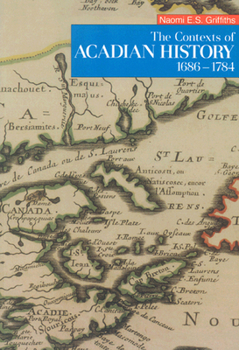The Contexts of Acadian History, 1686-1784
Select Format
Select Condition 
Book Overview
In 1600 there were no such people as the Acadians; by 1700 the Acadians, who numbered almost 2,000, lived in an area now covered by northern Maine, New Brunswick, Nova Scotia, Prince Edward Island, and the southern Gasp region of Quebec. While most of their ancestors had come to live there from France, a number had arrived from Scotland and England. Their relations with the original inhabitants of the region, the Micmac and Malecite peoples, were generally peaceful. In 1713 the Treaty of Utrecht recognized the Acadian community and gave their territory -- on the frontier between New England and New France -- to Great Britain. During the next forty years the Acadians continued to prosper and to develop their political life and distinctive culture. The deportation of 1755, however, exiled the majority of Acadians to other British colonies in North America. Some went on from their original destination to England, France, or Santo Domingo; many of those who arrived in France continued on to Louisiana; some Acadians eventually returned to Nova Scotia, but not to the lands they once held. The deportation, however, did not destroy the Acadian community. In spite of a horrific death toll, nine years of proscription, and the forfeiture of property and political rights, the Acadians continued to be part of Nova Scotia. The communal existence they were able to sustain, Griffiths shows, formed the basis for the recovery of Acadian society when, in 1764, they were again permitted to own land in the colony. Instead of destroying the Acadian community, the deportation proved to be a source of power for the formation of Acadian identity in the nineteenth century. By placing Acadian history in the context of North American and European realities, Griffiths removes it from the realms of folklore and partisan political interpretation. She brings into play the current historiographical concerns about the development of the trans-Atlantic world of the seventeenth and eighteenth centuries, considerably sharpening our focus on this period of North American history.
Format:Paperback
Language:English
ISBN:0773508864
ISBN13:9780773508866
Release Date:February 1992
Publisher:McGill-Queen's University Press
Length:160 Pages
Weight:0.55 lbs.
Dimensions:0.5" x 6.1" x 8.9"
Customer Reviews
2 ratings
great book for any "Cajun" with a STRONG passion for our history
Published by Thriftbooks.com User , 15 years ago
Written by a Canadian Research/History Professor, it is full of many historical facts that are quite hard to find. Because she is a history professor, it does seem to sort of "drag on" as you read. Reading this book was like sitting in a classroom listening to a history lesson... So you really must have a passion for history to get through this book. And at times she makes (few, but short) references in French, with no English translation. Those are the only "bad" things I can say about this book. If you are of Acadian descent, whether from South Louisiana, Canada, or elseware, or if you are simply interested in the history of the Cajun/Acadian people...this book is a MUST HAVE for your collection. It's the only book I've found (or seen reference to in other books), which covers this very important part of Acadian history. She reveals the birth of this dying culture. While she does delve into the Acadian Exile towards the end, this book is about more than just how my ancestors were mistreated. It tell's the story of where these people came from, when, how, & why. Explains how the Acadians (cajuns) starting as European colonists, became a people with their own identity over the span of only a few generations with no real ties to their native countries. You could say, they had become a country of their own. Those who share this ethnic identity, are a foriegn people wherever they may live, with no "mother country" to return to. If you want to know how these people lived, how their community grew & spread geographically (before the deportation), and just what kind of people they were, this is the book for you. I did say it get's hard to read at times, but every issue she covers in this book is so compelling I couldn't put it down. Through my research in Cajun/Acadian history, I've learned that I am of Acadian/Creole/Euro French descent. I simply call myself a "Cajun", like most other's from South Louisiana. If you share a similar background to mine, and want to better understand your own culture, you will find this book quite interesting. Also, you'll notice many similarities between the life of these people over 300 years ago & the way you grew up. I've known "what I am" all my life. But now I know what it is that makes us, the Cajuns, who we are and many reasons why our culture is so unique. Things I never would have realized having never read this book, along with a couple others. This story tell's about the begining. If you've ever asked the question "what is a Cajun?", you might find the answer here.
From a novice
Published by Thriftbooks.com User , 22 years ago
I just discovered Acadian ancestry and am searching for my roots. I found Griffiths book to be informative on the contexts of Acadian history as advertised. The text is written for historians and well done, but it assumes too much knowledge of Acadian history for a novice. It would also have helped to have the French translated into English.






